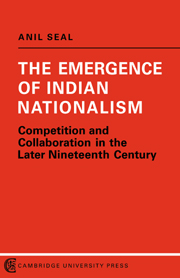Book contents
- Frontmatter
- Contents
- List of Maps and Tables
- Preface
- Abbreviations
- India: British Provinces and Native States
- 1 Political India
- 2 The Political Arithmetic of the Presidencies
- 3 The Rewards of Education
- 4 The Policies of the Rulers
- 5 The Politics of the Associations
- 6 The Politics of Union
- 7 The Muslim Breakaway
- 8 Perspectives
- Appendices
- Glossary
- Biographical Notes
- Bibliography
- Index
- Frontmatter
- Contents
- List of Maps and Tables
- Preface
- Abbreviations
- India: British Provinces and Native States
- 1 Political India
- 2 The Political Arithmetic of the Presidencies
- 3 The Rewards of Education
- 4 The Policies of the Rulers
- 5 The Politics of the Associations
- 6 The Politics of Union
- 7 The Muslim Breakaway
- 8 Perspectives
- Appendices
- Glossary
- Biographical Notes
- Bibliography
- Index
Summary
This book is the first in a series in which John Gallagher and I will examine the history of political change in south Asia from the 1870s to the 1940s. We have divided the period between us at about 1918, but neither of us promises not to stray across this boundary. The second volume will carry the analysis from 1888 to 1912; it will be the joint work of Gordon Johnson, Fellow of Trinity College, and myself. In all, there will be about five volumes.
In this book the chief task has been to study the emergence of national political organisation in India. This has led me to concentrate upon Indians educated in the western mode; for the same reason the stress has fallen upon the political experiments taking place within the three Presidencies of Bengal, Bombay and Madras during the viceroyalties of Lytton, Ripon and Dufferin. This simplification of the totality of Indian politics is deliberate. It omits for the time being much discussion of the confused stirrings of more traditional types of politics, and says little about the political scene in northern and central India. The reader need not be perturbed at these omissions. Occasionally in this series chronology will have to be sacrificed to coherence. These themes will be raised and placed in their historical context from the point in time when they became important weights in the Indian political balance.
In the research for this volume the unpublished records of government have been less important than for the later volumes.
- Type
- Chapter
- Information
- The Emergence of Indian NationalismCompetition and Collaboration in the Later Nineteenth Century, pp. xiii - xivPublisher: Cambridge University PressPrint publication year: 1968

